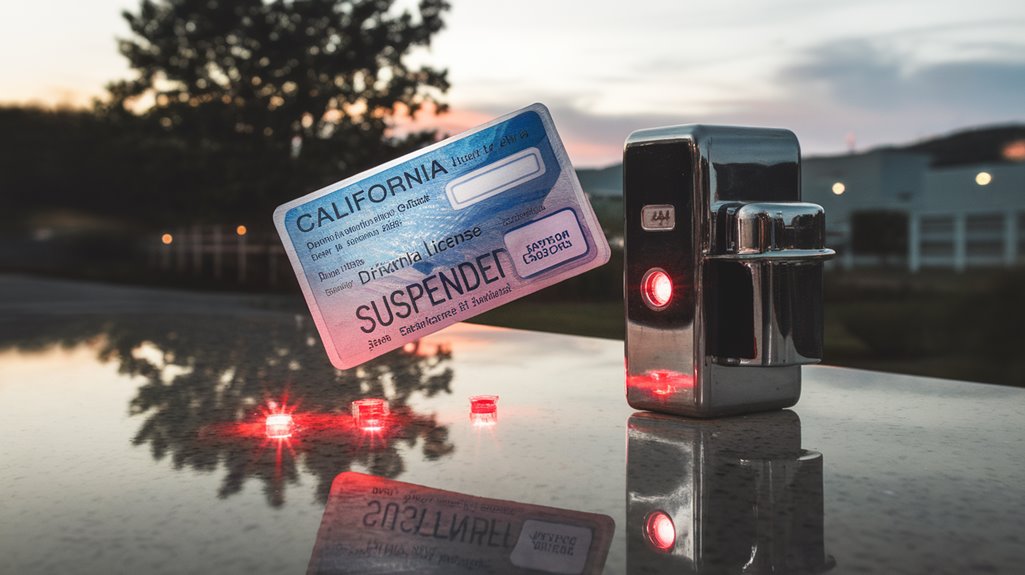California's implied consent law requires drivers to submit to chemical testing when arrested for DUI. Refusing a post-arrest breathalyzer test leads to automatic license suspension, ranging from one to three years depending on prior offenses. Additional penalties include higher fines, possible jail time, and mandatory DUI programs. Courts view test refusal as evidence of guilt during sentencing. Understanding the full scope of implied consent helps drivers make informed decisions when facing DUI arrests.
Key Takeaways
- California's implied consent law requires all drivers to submit to chemical testing after a lawful DUI arrest.
- Refusing a post-arrest breath test results in automatic license suspension, starting at one year for first offenses.
- Test refusal can be used as evidence of guilt in court and leads to enhanced penalties beyond standard DUI charges.
- Drivers can choose between breath or blood tests after arrest, but refusing both results in additional legal consequences.
- Pre-arrest breath tests are voluntary for most drivers, while post-arrest testing is mandatory with serious penalties for refusal.
What California's Implied Consent Law Really Means

When drivers get behind the wheel in California, they automatically agree to follow the state's implied consent law. This law requires all drivers to submit to breath or blood testing if they are arrested for DUI. The requirement applies to everyone operating a vehicle on California roads, whether they have a state license, out-of-state license, or are driving a commercial vehicle or bicycle.
Under Vehicle Code 23612, refusing DUI testing after arrest carries serious consequences, including automatic license suspension and additional penalties beyond standard DUI charges. While blood tests now require warrants following the Birchfield decision, breath test refusals remain fully enforceable. The implied consent law exists separately from federal case law and is based on the agreement drivers make simply by operating vehicles on California roads. Refusing a breathalyzer test can lead to harsher penalties, such as increased fines and mandatory DUI education programs. Additionally, those who refuse testing may face longer license suspensions compared to drivers who comply. Courts often view refusal as an admission of guilt, which can negatively impact a defense in DUI proceedings.
The Legal Difference Between Pre-Arrest and Post-Arrest Testing
California law makes a clear distinction between DUI testing that occurs before and after an arrest. Pre-arrest testing, including preliminary breath tests and field sobriety tests, remains voluntary for most drivers with no automatic penalties for refusal. However, post-arrest testing falls under strict implied consent requirements.
Key differences between pre-arrest and post-arrest testing include:
- Pre-arrest tests are optional and refusal carries no direct penalties, except for drivers under 21 or those on DUI probation
- Post-arrest tests are mandatory under Vehicle Code 23612, with significant consequences for refusal including extended license suspension
- During post-arrest testing, suspects must choose between breath or blood tests, while pre-arrest testing offers more flexibility in participation
These distinctions help protect both driver rights and law enforcement procedures during DUI investigations.
License Suspension Periods and Administrative Penalties

Drivers who refuse chemical tests after a DUI arrest face strict administrative penalties through the Department of Motor Vehicles. For a first offense, the DMV automatically suspends the driver's license for one year. Second-time offenders within 10 years receive a two-year suspension, while third offenses result in a three-year suspension.
Administrative penalties take effect regardless of the DUI case outcome. The DMV initiates these suspensions upon receiving notification of refusal, though drivers have 10 days to request a hearing to challenge the suspension. Beyond license suspension, refused tests result in civil fines between $100 and $500, plus reinstatement fees of $100 to $200. Drivers must also complete mandatory DUI education programs and may face increased insurance premiums.
Criminal Court Consequences of Test Refusal
Refusing a chemical test after a DUI arrest triggers serious criminal consequences beyond standard DUI penalties. When defendants refuse testing, courts impose enhanced sentences and higher fines, even if the DUI charge gets reduced through plea bargaining. Test refusal penalties stack on top of regular DUI conviction impacts, leading to longer mandatory jail terms and extended alcohol education programs.
Refusing a chemical test after DUI arrest can drastically increase penalties, even with reduced charges through plea deals.
Key impacts of test refusal in criminal court:
- First-time refusals face additional fines and potential jail time when connected to DUI charges
- Prosecutors can use the refusal as evidence of "consciousness of guilt" to seek maximum penalties
- Repeat refusals within 10 years result in progressively harsher criminal sentences
The court considers test refusal an aggravating factor during sentencing, treating it as deliberate indifference to alcohol levels when the refusal violates implied consent laws.
Defending Against Chemical Test Refusal Charges

Skilled defense attorneys can challenge chemical test refusal charges through several key legal strategies. These defense strategies focus on scrutinizing the lawfulness of traffic stops, examining police procedural compliance, and identifying potential medical exemptions that may justify test refusal.
Common legal loopholes include challenging probable cause for the initial stop, proving officers failed to properly advise defendants of refusal consequences, or demonstrating physical inability to complete testing due to medical conditions or accident-related trauma. Attorneys typically review whether officers documented proper justification for the arrest and followed standard protocols for offering test choices. If law enforcement failed to meet these requirements or made procedural errors, both the refusal charges and underlying DUI allegations may be dismissed.
Frequently Asked Questions
Can a Non-English Speaker Claim They Didn't Understand Implied Consent Warnings?
Yes, non-English speakers can challenge implied consent violations based on language barriers. If officers fail to provide adequate interpretation during warnings, defendants may claim they couldn't understand their rights or obligations. The legal implications of this defense can lead to dismissed refusal penalties, though it won't necessarily affect the underlying DUI charge. Courts typically require proof that the person genuinely couldn't comprehend the warnings due to language difficulties.
How Soon After Refusing Can I Apply for a Restricted License?
Ah, the classic "refuse now, regret later" scenario! After refusing a chemical test, drivers face different waiting periods before applying for a restricted license. First-time offenders must wait 30 days, while repeat offenders wait 45 days. Restricted license eligibility requires completing several steps: installing an ignition interlock device, enrolling in DUI classes, filing SR-22 insurance, and paying a $125 reinstatement fee. The refusal consequences are pretty straight-forward – no shortcuts allowed!
Do Medical Conditions Exempt Drivers From Both Breath and Blood Testing?
Medical exemptions do not automatically excuse drivers from both breath and blood testing during DUI stops. While certain conditions may prevent breath testing, officers must then proceed with blood testing as an alternative. Only when both methods are medically impossible would a complete exemption be considered. Drivers must provide proper medical documentation within 10 days of arrest, and the condition must be formally verified to avoid refusal penalties.
Are Portable Breath Test Devices as Accurate as Station Breathalyzers?
A 2021 Penn Medicine study revealed that portable breathalyzers failed to detect legal limits in over half of cases where drivers were actually above 0.08% BAC. When comparing breathalyzer accuracy, portable devices show up to 25% error rates, while station units maintain much higher precision at around 5%. This significant difference in portable device reliability stems from factors like inconsistent calibration, environmental interference, and varying blood-to-breath ratios among individuals.
Can Police Request Tests if Prescription Medications Caused Impaired Driving?
Yes, police can request chemical tests if they suspect impaired driving caused by prescription medications. Officers must have probable cause to believe a driver is impaired, even if the substances are legally prescribed. Just like alcohol-related cases, drivers must submit to blood or breath tests under implied consent laws. Refusing these tests can result in license suspension and other penalties, regardless of whether the impairment stems from prescription or illegal substances.
Conclusion
California's implied consent laws carry serious consequences for refusing chemical tests. While some argue these penalties are too harsh, they serve an important public safety purpose by encouraging cooperation with DUI investigations. Drivers should understand that test refusal can lead to longer license suspensions and additional criminal charges on top of any DUI penalties. Being informed about these laws helps people make better decisions when interacting with law enforcement.
